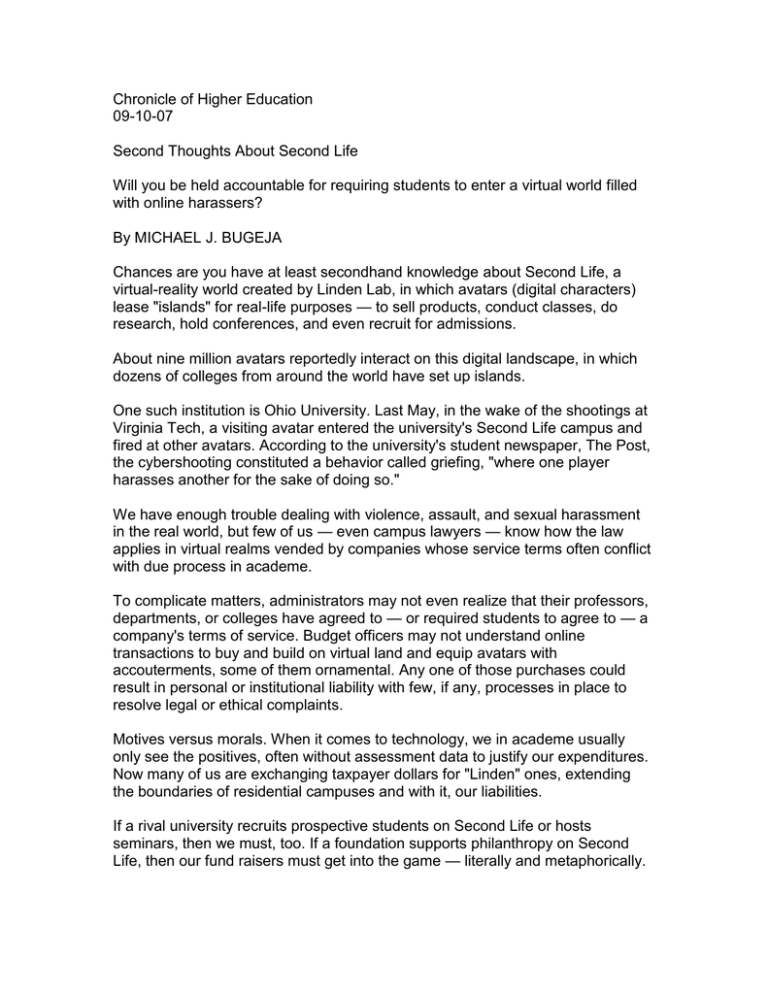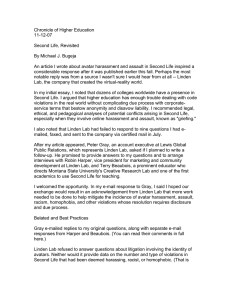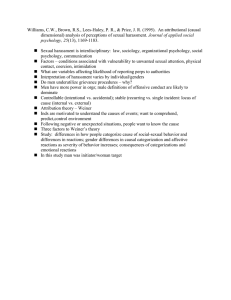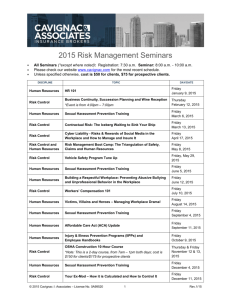Chronicle of Higher Education 09-10-07 Second Thoughts About Second Life
advertisement

Chronicle of Higher Education 09-10-07 Second Thoughts About Second Life Will you be held accountable for requiring students to enter a virtual world filled with online harassers? By MICHAEL J. BUGEJA Chances are you have at least secondhand knowledge about Second Life, a virtual-reality world created by Linden Lab, in which avatars (digital characters) lease "islands" for real-life purposes — to sell products, conduct classes, do research, hold conferences, and even recruit for admissions. About nine million avatars reportedly interact on this digital landscape, in which dozens of colleges from around the world have set up islands. One such institution is Ohio University. Last May, in the wake of the shootings at Virginia Tech, a visiting avatar entered the university's Second Life campus and fired at other avatars. According to the university's student newspaper, The Post, the cybershooting constituted a behavior called griefing, "where one player harasses another for the sake of doing so." We have enough trouble dealing with violence, assault, and sexual harassment in the real world, but few of us — even campus lawyers — know how the law applies in virtual realms vended by companies whose service terms often conflict with due process in academe. To complicate matters, administrators may not even realize that their professors, departments, or colleges have agreed to — or required students to agree to — a company's terms of service. Budget officers may not understand online transactions to buy and build on virtual land and equip avatars with accouterments, some of them ornamental. Any one of those purchases could result in personal or institutional liability with few, if any, processes in place to resolve legal or ethical complaints. Motives versus morals. When it comes to technology, we in academe usually only see the positives, often without assessment data to justify our expenditures. Now many of us are exchanging taxpayer dollars for "Linden" ones, extending the boundaries of residential campuses and with it, our liabilities. If a rival university recruits prospective students on Second Life or hosts seminars, then we must, too. If a foundation supports philanthropy on Second Life, then our fund raisers must get into the game — literally and metaphorically. Anyone who advises caution, as I am here, can be dismissed as a Luddite while new-media neophytes come off as cutting edge. But the true motive of technological interfaces and applications is often money. When it comes to Second Life, however, we're not only talking about money. We're talking about whether you as a professor or administrator will be held accountable for introducing your students and/or employees to a virtual world that accepts little responsibility for anything that happens among avatars, including online harassment and assault. Let's establish that both exist and can be grounds for a legal complaint. In the spring 2007 issue of the Indiana Law Journal, Erez Reuveni cites a case of assault in a text-based environment, acknowledging that female avatars who experience virtual sexual harassment (and even rape) report suffering real-world anger and grief. In the "Police Blotter" section of its May 2006 newsletter, Second Opinion, Linden Lab acknowledged that assault and harassment are the two most-common violations in its virtual world. Harassing behaviors included "continuous instant messaging and other unwanted contact, sexual harassment, verbal abuse" and impeding the movement of avatars. Linden Lab said the motives and behavior of online harassers were "not that different from real-world harassment" and the company acknowledged "a definite 'creep factor'" when the harasser is anonymous. Anonymity, of course, rules Second Life. In commentary on Wired.com, Regina Lynn notes that Brussels police were investigating allegations of rape in Second Life (see http://www.wired.com/culture/lifestyle/commentary/sexdrive/2007/05/sexdrive_05 04). The report may have been bogus, she adds, but it sparked discussion about the legalities of sexual assault in online forums. Granted, it would be difficult to convict an avatar on a rape charge when sexualassault law is based on physical rather than emotional trauma. Conversely, sexual-harassment law is based on the latter. Recently Linden Lab, acting on a report by a German television station, banned two users — one a child avatar, another an adult — engaged in sexual "age play." For a full account, read about Second Life's investigation (http://blog.secondlife.com/2007/05/09/accusations-regarding-child-pornographyin-second-life/#more-952). According to its terms of service, Linden Lab has the "right but not the obligation" to resolve such disputes. Of note, however, is this clause: "As a condition of access to the Service, you release Linden Lab (and Linden Lab's shareholders, partners, affiliates, directors, officers, subsidiaries, employees, agents, suppliers, licensees, distributors) from claims, demands and damages (actual and consequential) of every kind and nature, known and unknown, suspected and unsuspected, disclosed and undisclosed, arising out of or in any way connected with any dispute you have or claim to have with one or more users of the Service." What about a complaint by a student who agrees to meet the teacher's avatar outside of class but in the virtual world and then witnesses or engages in an unwanted virtual act? Or a claim of emotional distress filed by a student exposed to virtual shootings or any number of sexist, racist, homophobic, or offensive avatar behaviors? Who is responsible? Did you, as a faculty member who assigned your students an exercise on Second Life, have appropriate warnings in your syllabus for such scenarios? Will you have to pay legal fees to defend yourself if you signed up for Second Life and required your students to do so, too, without informing your supervisor? Does your institution's top administration or its legal, ombudsman, and equity offices even know about sexual harassment in virtual worlds? Has your campus teaching center promoted virtual-life games without investigating guidelines for use? Based on its terms of service, Linden Lab may have anticipated some of those questions. It identifies itself as a distributor of content and, as such, "has very limited control, if any, over the quality, safety, morality, legality, truthfulness, or accuracy of various aspects of the Service." That burden may fall on you. Process versus processors. You may not have fully analyzed a company's terms of service. Your human-resources department or equity office may know little about harassment or assault in virtual realms. It's time to start cramming. When such complaints are filed in the real world, we have procedures and rights to ensure due process. We take certain things for granted — that we know the identity of the perpetrator(s) and, if not, that campus officials will disclose that information. Many of those rights exist because protocols have been followed — protocols so obvious that we often overlook them. Most colleges and universities have strict accounting procedures that must be followed before companies can even qualify as vendors. Campus lawyers take contract law seriously. We're scrupulous about our syllabi, which are increasingly seen as legal contracts. We include clauses about dishonesty, disability accommodations, and procedures to report offensive language and actions. We routinely allow students to leave the room when showing potentially offensive material — this, in an age of YouTube — again, because of complaint and litigation. But somehow, the allure of technology is such that virtual worlds seduce us with instantaneous eye candy of the ego. Certainly, we should analyze online entrepreneurial cultures and social interactions of Second Life in classes whose catalog descriptions allow that. We also should prepare students for mature content over which we have little control, especially when requiring classes to visit virtual worlds whose avatars enjoy anonymity in anything-goes environments. The environment so captivates users that many forget their first lives so as to spend time and money in their second ones, with a U.S. dollar worth about 270 Linden dollars. If you're using an institutional credit card to buy those dollars, are you ready for a campus audit that requisitions items actually purchased in the virtual world? If you're requiring students to use credit cards in Second Life — justifying that as a textbook-like expense — are you ready for parents or legislators to scrutinize those purchases, taking into account their concerns about rising tuition and student debt? Professors taking students on a "field trip" to Second Life, forcing them to agree to terms of service, may involuntarily circumvent academic principles of transparency, disclosure, and due process. The same goes for the administrator who purchases an island without informing the provost or president, and for the provost or president if they approve such purchases and then must respond to constituents when controversy occurs. Controversy will occur, although many of us do not seem to be anticipating any in this realm. That perplexes me. We deal regularly with e-mail scams, viruses, online predators, and hackers thieving financial data. Most of us concede that controversy occurs often enough in the real world. Why do we doubt it would occur in a virtual world whose service terms bestow anonymity and disavow liability? Standards versus practices. To investigate online harassment, intolerance, and abuse, I e-mailed, faxed, and sent by registered mail nine questions in a media request to Second Life. (You can read my letter at http://www.livingethics.org/Linden.html.) Linden Lab has yet to respond, although I made the request in July. Melissa Blevins, a lawyer who practices civil law in Des Moines, believes cases can be brought against professors and their institutions when participation in Second Life is required or recommended and harassing behaviors occur there. To be released from liability, she said, professors would need to insert a clause in their syllabus stating: "Second Life participation is voluntary and lack of participation will not affect your grade." If you're requiring participation, holding classes in Second Life, you and/or your institution also may be accepting liability for virtual events that happen there. Few campus lawyers were willing to go on the record with other suggestions or warnings because legal standards in this area have not yet been fully determined. That suggests that universities have rushed into online consumer markets without fully understanding liabilities. Until we do, we must rely on traditional academic standards: Procedure: Send a copy of this article to your campus lawyer, equity officer, accountant, human-resources supervisor, teaching-center director, network administrator, and ombudsman, requesting their opinions about issues raised here. Debate: Hold a public forum and/or a faculty meeting to discuss these issues openly with experts on cyberlaw, new media, technology, gaming, harassment, ethics, and other related disciplines. Research: Go online to view the warnings and disclaimers included in the syllabi of computer-science professors,scholars in studio and fine arts, and in social, forensic, and medical sciences (to name a few) whose real or online environments might expose students to potentially offensive content. Best practices: Prepare faculty members and students for the Second Life experience in orientations, adopting the policies already in use by campus programs that routinely expose students to unfamiliar environments, such as travel abroad, archaeological digs, social work, internships, and volunteer work. Assessment: Analyze technology use in terms of cost versus learning outcomes and keep files documenting your institutional efforts to be used in accreditation as well as disputes. Linden Lab says it has "the right but not the obligation to resolve disputes." You as an educator have the right and the obligation to use academic principles to explore harassment issues in the for-profit tech world now embedded in academe. Michael Bugeja is director of the school of journalism and communication at Iowa State University. He has a new book out, Living Ethics Across Media Platforms, published by Oxford University Press.



